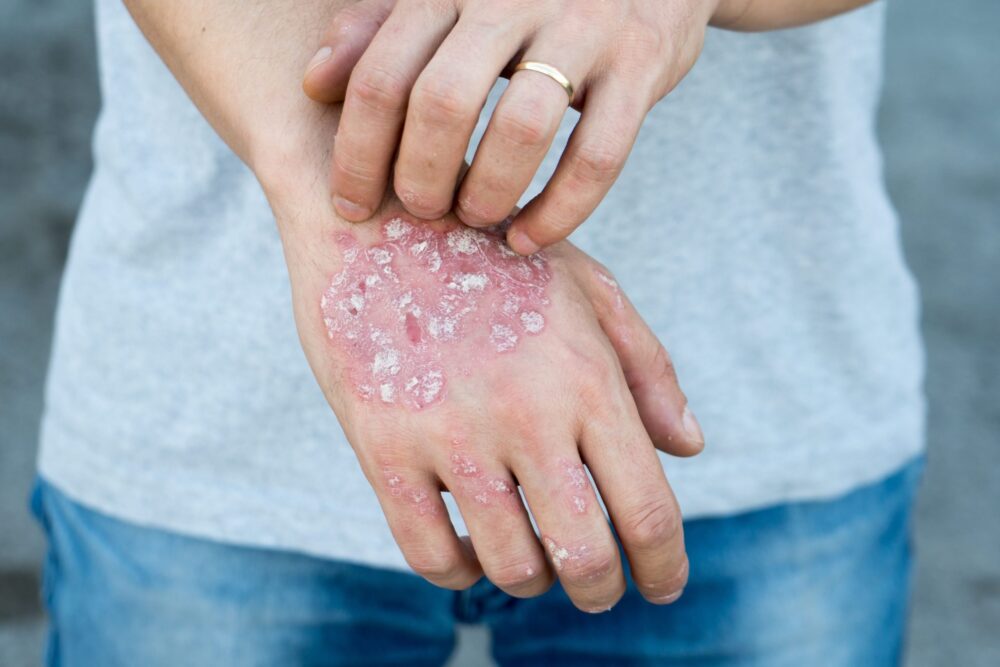Your skin is the largest organ and the most visible. Skin conditions like psoriasis can be hard to live with and can reduce your quality of life.
What is psoriasis?
Psoriasis causes raised patches of red and scaly skin. These are commonly found on the knees, elbows, trunk and scalp, but they can also appear on the eyelids, ears, mouth and lips, hands, feet and nails. These areas of sore skin can be irritating and painful, making it hard to concentrate or sleep.
What are the causes of psoriasis?
About 2% of Australians live with psoriasis. It is often associated with other conditions such as heart disease, Coeliac disease, diabetes, obesity, high blood pressure or mental health conditions.
Psoriasis isn’t contagious but it does tend to run in families and genes play a role. The immune system is also at fault. Normally, the immune system defends the body by attacking pathogens that might cause sickness. But with autoimmune conditions like psoriasis, the body’s immune system attacks healthy cells – in this case, healthy skin cells.
As a result, the body increases production of new skin cells. Those extra skin cells pile up on the skin’s surface, causing psoriasis.
As yet, there is no cure for psoriasis. Treatment aims to stop skin cells growing so quickly to remove scales. Treatment options include creams and ointments, light therapy and medications.
Psoriasis and diet
Many foods are known to cause inflammation in the body, including alcohol, fatty foods, sugary foods and refined carbohydrates. Sometimes, that inflammation can worsen psoriasis.
Reducing inflammation is therefore important. A healthy lifestyle combined with weight loss is beneficial for patients with moderate to severe psoriasis, and a close cooperation between nutritionists and dermatologists is necessary for the management of psoriasis.
But cutting out the cakes and chips may not eliminate inflammation. In some people, inflammation can occur in response to healthy foods including healthy ones like fish, fruit and vegetables. That’s due to food intolerances, known as delayed food allergies or IgG allergies.
The role of IgG testing in psoriasis
IgG is a defence protein that your immune system deploys to fight a foreign substance called an antigen, which your body perceives as a threat. Inflammation is part of your body’s strategy to destroy the antigen.
Sometimes, your body mistakenly identifies certain food proteins as invaders and generates a food-specific IgG antibody leading to inflammation. You can’t see that inflammation because it’s inside your gut. IgG-mediated food hypersensitivity can trigger the development of diseases where inflammatory pathways are involved, such as psoriasis.
Is there any research on psoriasis and food intolerances?
A few years ago, ImuPro undertook a clinical observation study, to collect evidence on the efficacy of ImuPro testing in patients with very different conditions that may indicate food intolerance. These included psoriasis, neurodermatitis, headaches/migraines, overweight/obesity, fatigue, rheumatic diseases or gastroenterological complaints.
A total of 938 patients participated in this trial and 2/3 of the patients with psoriasis noted an improvement of their disease symptoms when they avoided IgG-positive foods for 8 weeks.
If you’d like to learn more about this work, please read this Scientific News article by Dr Camille Lieners.
With testing from ImuPro, you can quickly and effectively discover if you have food intolerance and food allergy that may be affecting your skin. Take our free self-assessment to see if IgG allergy testing could help you.
Disclaimer
*All information is general and is not intended to be a substitute for professional medical advice.
References
- Mayo Clinic, Psoriasis, https://www.mayoclinic.org/diseases-conditions/psoriasis/symptoms-causes/syc-20355840, [Accessed 12 January 2024]
- Royal Australian College of General Practitioners, The multiple comorbidities of psoriasis, https://www1.racgp.org.au/ajgp/2020/july/the-multiple-comorbidities-of-psoriasis, [Accessed 12 January 2024]
- American Academy of Dermatology Association, Psoriasis causes, https://www.aad.org/public/diseases/psoriasis/what/causes, [Accessed 12 January 2024]
- Johns Hopkins Medicine, Psoriasis diet: Foods to eat and avoid if you have psoriasis, https://www.hopkinsmedicine.org/health/conditions-and-diseases/psoriasis-diet-foods-to-eat-and-avoid-if-you-have-psoriasis, [Accessed 12 January 2024]
